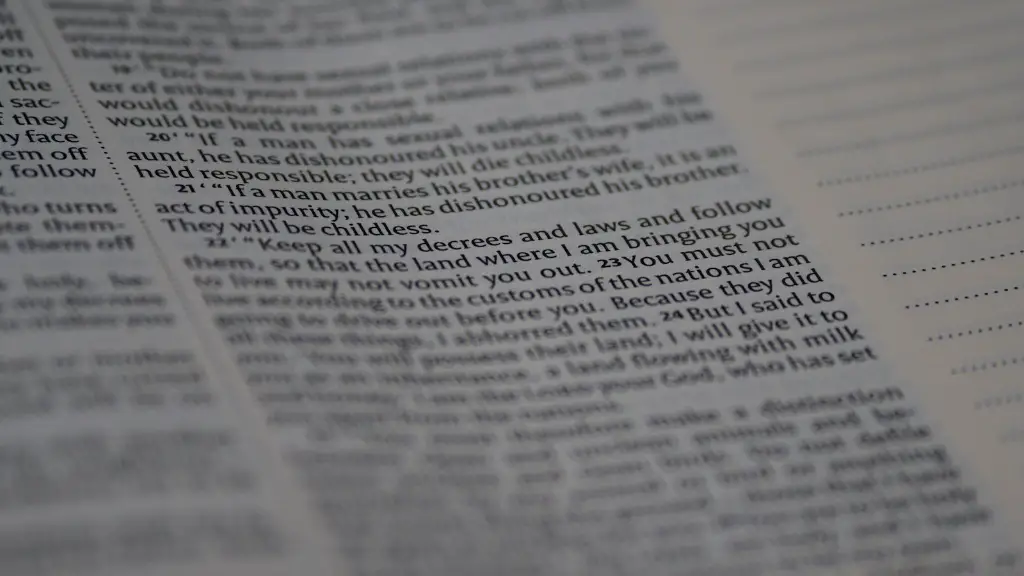The Bible is full of words and images that point to the concept of righteousness. These words convey an idea of morality, obedience, and justice that can be found throughout the Bible. The concept of righteousness has been held in high esteem in Christianity throughout history and is a subject of great debate today. To understand what the Bible says about righteousness, one must look at the examples of “righteous” individuals in the Bible.
For instance, Abraham is considered one of the most righteous people mentioned in the Bible. He is an example of what a true follower of God should be: obedient and committed to God’s desires. Abraham was willing to obey God even when it seemed impossible, such as when he was asked to offer his son, Isaac, as a sacrifice. Additionally, Moses is another example of righteousness. He never wavered in his faith and trust in God, despite the troubles and difficulties he encountered while leading the Jewish people out of Egypt.
In the New Testament, Jesus is an example of what perfect righteousness is. Even in the face of unyielding opposition and suffering, Jesus remained committed to doing what was right in the eyes of God. During His ministry, He brought the idea of righteousness to a new level by advocating for the marginalized, forswearing vengeance and practicing non-violence, and living a humble and gracious life.
Beyond a few key examples, the Bible is filled with directives that can help guide people in the path of righteousness. For example, Deuteronomy 6:25 calls for people to love God whole-heartedly. Other examples are found throughout the Bible in the Ten Commandments (prohibiting murder, theft and idolatry, for instance). Proverbs are also filled with teachings about how to live a righteous life. “Do unto others as you would have them do unto you” (Matthew 7:12) and “Love your neighbor as yourself” (Leviticus 19:18) are both examples of these teachings.
The Bible also has a great deal to say about justice and mercy, which are intimately related to righteousness. In Micah 6:8, God commanded His people to “Act justly, love mercy, and walk humbly with your God.” This is a reminder that justice, mercy, and humility must be exercised in equal measure in order to live a righteous life.
Furthermore, the Bible speaks of justice that is based on the principle of retribution. This is the idea that, when someone does something wrong, another person should do something to restore that person’s honor. This principal is exemplified in the story of Job, who suffered a great deal of pain and loss but was eventually rewarded with riches and honor.
Finally, the Bible speaks to the idea of restorative justice as well. This is a form of justice that seeks to repair the damage done by sin, rather than punishing the sinner. In the parable of the Prodigal Son, for example, the father welcomed his lost son back with open arms and provided for him, seeking to restore the relationship that had been broken by sin.
The Meaning of Righteousness
The concept of righteousness is closely linked to morality, ethics, and justice. In the Bible, righteousness is much more than simply living a moral life. It is about being obedient to God and living in alignment with His will, understanding that goodness comes from Him alone. Righteousness is also closely associated with justice because it involves doing what is right and just, even when it is difficult or uncomfortable. Righteousness is also closely linked to mercy and forgiveness, as seen in examples such as the Prodigal Son.
The Role of Righteousness in Christianity
Righteousness is essential to living a Christian life. The Apostles taught about the importance of living a righteous life and the example of Jesus is a reminder of what true righteousness looks like. Righteousness is also linked to the promise of eternal life after death for those who strive to live a righteous life here on earth.
How to Live Righteously in Everyday Life
Living a righteous life in today’s world is no easy task. It involves making difficult choices and resisting the temptation to do what is popular or easy. Living a righteous life requires self-awareness and the ability to measure right and wrong. Additionally, it requires a renewed commitment to God and the desire to serve Him above all else.
Practical Tips for Living Righteously
One way to live a more righteous life is to learn and study the Bible regularly. This will provide guidance on the correct path to righteousness. Additionally, prayer and meditation are essential for attaining a righteous state of mind. Prayer can help a person turn to God in times of difficulty and meditation can help one practice self-control and bypass the allure of materialism and passion. Finally, living in a supportive community is also helpful in living a righteous life. Having people who are also committed to righteousness is a great help to staying on track.
The Rewards of Righteousness
The Bible promises great reward to those who choose to walk the path of righteousness. In addition to eternal salvation and an improved life here on earth, righteousness can bring peace and joy. Those who practice righteousness can experience the blessings of God in a deeper and more meaningful way than those who live in sin.
The Consequences of Unrighteousness
The consequences of unrighteousness can be drastic. The Bible warns that “sinful desires” will lead to death (Romans 6:23). Additionally, unrighteousness can lead to a broken relationship with God, despair, and a miserable existence here on earth.
Making the Choice to Live Righteously
Ultimately, it is up to the individual to make the choice to live righteously. Everyone is at a crossroads between righteousness and unrighteousness. The Bible encourages us to make the right choice and to strive for perfection in our behavior. Doing so can bring untold blessings and bring us closer to God.


